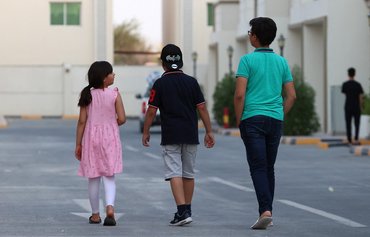WASHINGTON -- US President Joe Biden on Monday (January 31) announced he was designating Qatar a "major non-NATO ally", opening the door to closer military and commercial ties between the United States and the Gulf state.
The announcement came as he hosted Sheikh Tamim bin Hamad al-Thani at the White House, underscoring the Gulf state's strategic importance.
The emir is the first Gulf state leader to visit Biden since he became president.
Just ahead of the Qatar emir's visit, Washington and Kuwait concluded a strategic dialogue, affirming their 60-year relationship and looking to the future.
![US Secretary of State Antony Blinken and Kuwaiti Foreign Minister Sheikh Ahmad Nasser al-Mohammed Al Sabah elbow bump each other during a press conference at Kuwait's foreign ministry headquarters in Kuwait City last July 29. The two took part in a strategic dialogue in Washington that concluded January 26. [Yasser al-Zayyat/AFP]](/cnmi_am/images/2022/02/01/33823-Blinken-Kuwait-minister-600_384.jpg)
US Secretary of State Antony Blinken and Kuwaiti Foreign Minister Sheikh Ahmad Nasser al-Mohammed Al Sabah elbow bump each other during a press conference at Kuwait's foreign ministry headquarters in Kuwait City last July 29. The two took part in a strategic dialogue in Washington that concluded January 26. [Yasser al-Zayyat/AFP]
In addition to meeting Biden, Sheikh Tamim met with Defence Secretary Lloyd Austin, Secretary of State Antony Blinken, members of Congress and other officials.
"Our partnership in Qatar has been central to many of our most vital interests," Biden said, ahead of a bilateral Oval Office meeting with a packed agenda.
"We want to talk about security in the Gulf and the broader Middle East, ensuring the stability of global energy supplies, continuing our work together to support the people of Afghanistan, and strengthening commercial co-operation," he said.
On that last note, the two leaders were able to celebrate a $20 billion deal for Qatar Airways to become the first customer for Boeing's new 777X cargo planes, with 34 aircraft in the initial order.
In a White House ceremony, Qatar Airways likewise signed a letter of intent for $6.7 billion for 25 737 MAX narrow-body airliners.
Strong friendship with Qatar
Biden described Qatar as "a good friend and a reliable partner".
The new "major non-NATO ally" designation recognises Qatar's place in the US military's global footprint, as well as opening the door to closer ties.
Among the Gulf states, only Kuwait and Bahrain have the designation, according to the Washington Post.
Qatar hosts US Central Command's forward headquarters at the massive al-Udeid air base, where about 10,000 US military personnel are stationed.
During the Afghan evacuation last year, Qatar hosted about 60,000 Afghans and Americans as they transited through al-Udeid.
The United States has moved its Afghanistan diplomatic mission to Qatar, raising Doha's profile as a key hub for diplomacy in the next phase.
It is also playing a role in efforts to resurrect the Iran nuclear deal.
Given Qatar's energy riches, it finds itself rising in importance on yet another front -- the transatlantic tensions over Russia's intentions in Ukraine.
Overshadowing the meeting were efforts to source enough natural gas to keep Europe heated through the winter if the brewing conflict with Russia escalates. Western capitals are threatening economic sanctions if Russia attacks Ukraine.
Qatar is one of the world's biggest liquid natural gas (LNG) exporters, along with the United States and Australia, and there are hopes in Washington and Europe that Doha can temporarily redirect exports destined for Asian markets.
But Qatar has little to no extra capacity in its LNG, and there are limitations to how much supply can be diverted from existing contracts.
"The volume of gas needed by the EU [European Union] cannot be replaced by anyone unilaterally, without disturbing supplies to other regions around the world. Europe's energy security requires a collective effort from many parties," Qatar's energy minister told the EU on Tuesday.
US, Kuwait reaffirm ties
Meeting in Washington on January 26, US Secretary of State Antony Blinken and Kuwaiti Foreign Minister and Minister of State for Cabinet Affairs Ahmed Nasser al-Mohammed Al Sabah concluded the fifth US-Kuwait Strategic Dialogue.
The two countries "reaffirmed a shared commitment to promoting the stability and security of the region and advancing mutual interests", including "defence and cybersecurity co-operation, bilateral trade and investment".
The two reflected on the enduring strength of six decades of strong, unwavering US-Kuwaiti relations, and discussed shared global and regional priorities, the US State Department said in a statement.
As key partners in the international coalition to defeat the "Islamic State of Iraq and Syria" (ISIS), they renewed their commitment to the group's enduring defeat, and pledged to stand together against Iran's destabilising influence.
The United States also recognised Kuwait's "generous support in the relocation from Afghanistan of American citizens and others", and both reiterated the need to bring peace to Yemen and ensure the free flow of humanitarian aid.
The United States expressed appreciation for the enduring bilateral defence partnership, and for Kuwait's longstanding support in hosting US forces.
The two sides discussed threats in the region and ways to strengthen the defence partnership, including through continued co-operation on modernisation, sustainability, training, exercises and operations.
They also reaffirmed the importance of working together to counter terrorism financing; and looked forward to working on a cybersecurity action plan with Kuwait's National Cyber Security Centre.

![US President Joe Biden participates in a bilateral meeting with Qatar's emir, Sheikh Tamim Bin Hamad Al-Thani, in the Oval Office of the White House on January 31 in Washington, DC. [Nicholas Kamm/AFP]](/cnmi_am/images/2022/02/01/33821-Biden-Qatar-emir-600_384.jpg)




